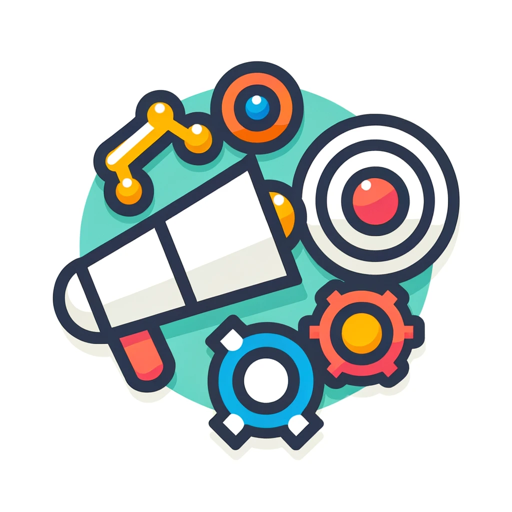Data Driven Marketing Strategy-AI-Powered Marketing Insights
AI-Driven Strategies for Marketing Success
Related Tools
Load More
Digital Marketing Mentor
I help with digital marketing strategies & campaigns.

Marketing
Marketing strategy advisor with a focus on effective campaign planning and engagement tips.

Marketing Strategy AI
Robust marketing AI with advanced advertising systems and social listening capabilities.

The Marketer
Meet your personal Marketing Strategy Consultant. Trained with the expertise of the best marketers of the last decade. I will coach to to build powerful brand strategies, and apply innovative social media, ads, content and copyrighting knowledge.

Marketing Strategizer
Crafting your perfect marketing strategy.

Marketing Advice
Generates marketing strategies based on “22 Immutable Laws of Marketing.”
20.0 / 5 (200 votes)
Introduction to Data Driven Marketing Strategy
Data Driven Marketing Strategy (DDMS) is a sophisticated approach to marketing that utilizes data analysis and interpretation to inform marketing decisions. The primary goal of DDMS is to optimize marketing efforts by understanding consumer behavior, preferences, and trends through the use of data. This strategy is designed to enhance targeting, personalization, and overall effectiveness of marketing campaigns. For instance, a company might use DDMS to analyze customer purchase history and preferences to create personalized email marketing campaigns that resonate more effectively with their audience. Another scenario could be a business leveraging social media analytics to determine the most engaging types of content for their followers, thereby increasing engagement and conversion rates.

Main Functions of Data Driven Marketing Strategy
Competitor Analysis
Example
Analyzing competitors' strengths, weaknesses, and market positioning.
Scenario
A retail company examines the online presence, customer reviews, and social media engagement of its top three competitors. This information is then used to identify gaps in their own strategy and to highlight unique selling propositions (USPs) that can differentiate their brand in the market.
Audience Segmentation
Example
Dividing a broad consumer or business market into sub-groups of consumers based on some type of shared characteristics.
Scenario
An e-commerce platform segments its customers into groups based on purchasing behavior, geographic location, and demographic data. This allows them to tailor their marketing messages and promotions to each segment, improving relevance and effectiveness.
Identifying Insights and Hooks
Example
Finding key insights from data that can be used to create compelling marketing messages.
Scenario
A tech company uses web analytics to discover that a significant portion of its website traffic comes from mobile devices. This insight leads them to optimize their site for mobile users and create mobile-centric marketing campaigns, resulting in a higher conversion rate.
Ideal Users of Data Driven Marketing Strategy Services
Small to Medium Enterprises (SMEs)
SMEs can significantly benefit from DDMS by using data insights to maximize their limited marketing budgets. They can gain a competitive edge through targeted campaigns that reach the right audience with the right message, reducing wasteful spending and improving ROI.
Marketing Agencies
Marketing agencies use DDMS to provide their clients with data-driven insights and strategies. This enables them to create more effective campaigns, demonstrate measurable results, and maintain a competitive advantage in the marketplace.

Steps for Using Data Driven Marketing Strategy
Step 1
Visit aichatonline.org for a free trial without login, no need for ChatGPT Plus.
Step 2
Set up your account by providing basic business details and selecting your product/service category.
Step 3
Input relevant data about your market, competitors, and target audience to get tailored insights.
Step 4
Utilize the platform's tools to analyze market trends, segment your audience, and identify key marketing opportunities.
Step 5
Apply the insights and recommendations to optimize your marketing strategies and track performance metrics for continuous improvement.
Try other advanced and practical GPTs
Book Buy AI - Find Books
AI-powered Amazon book finder.

Zen Co-Pilot by ty-gpt.com
AI-powered support for Zendesk.

Oferta Direta
AI-powered ad creation for all.
Hive Ideation Mentor
Empower Your Ideas with AI

Korean Teacher
AI-powered Korean conversation partner

Audio Plugin Engineer
AI-powered JUCE plugin solutions

CAE Simulation Expert-Ansys|Fluent|LS-DYNA|Abaqus
AI-powered CAE simulations for everyone.

Real Photo Maker
AI-driven image creation, effortlessly.

Kahve Falı Uzmanı / Coffee Reading Expert
AI-powered coffee readings with a story.

Creative Writing
AI-Powered Creative Writing Assistant

Performance Ads Writer
AI-Powered Ads for Maximum Impact

Cultural Translator Ads
AI-Powered Cultural Translation for Global Success.

- Market Research
- Trend Analysis
- Competitor Analysis
- Strategy Optimization
- Audience Segmentation
Q&A About Data Driven Marketing Strategy
What is Data Driven Marketing Strategy?
Data Driven Marketing Strategy involves using data analysis and interpretation to guide marketing decisions, optimize campaigns, and improve ROI. It leverages customer data, market trends, and competitor analysis to create effective marketing plans.
How can I integrate this tool with my existing marketing efforts?
You can integrate the tool by uploading your current marketing data, allowing it to analyze and provide insights that complement your ongoing campaigns. It can suggest improvements and new strategies based on the latest market trends and competitor activities.
What types of data can I analyze with this tool?
The tool allows you to analyze various types of data, including customer demographics, purchase behavior, social media interactions, market trends, competitor performance, and more. This comprehensive analysis helps in crafting more effective marketing strategies.
How does this tool help in identifying target audiences?
The tool segments your market based on demographic, psychographic, and behavioral data. It identifies distinct audience personas, their preferences, pain points, and media consumption habits, helping you tailor your marketing messages for maximum impact.
Can this tool provide real-time market insights?
Yes, the tool offers real-time market insights by continuously updating data from various sources. This ensures you have the latest information on market trends, customer behavior, and competitor strategies to make informed decisions promptly.